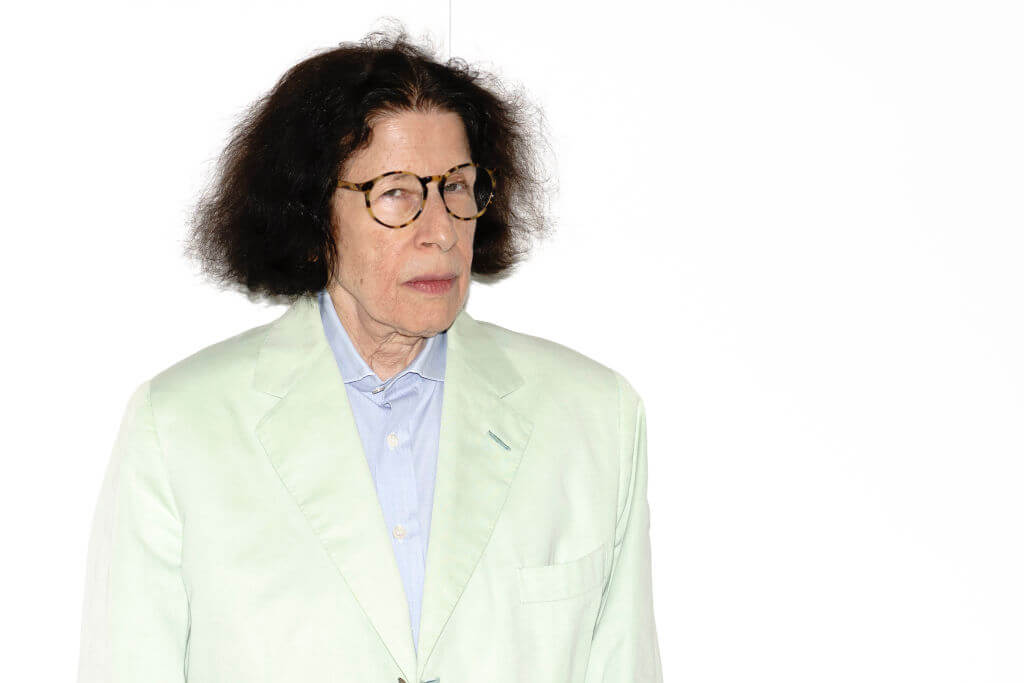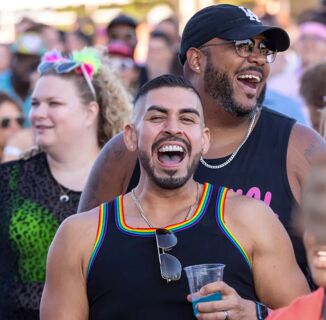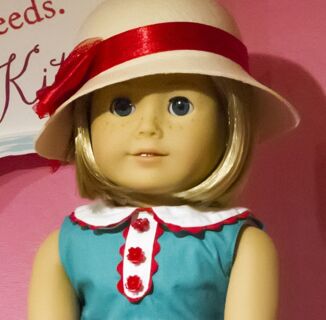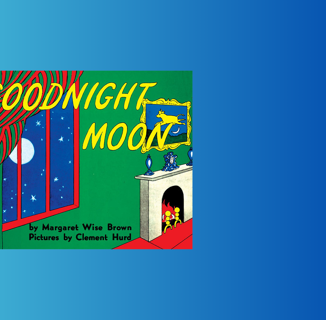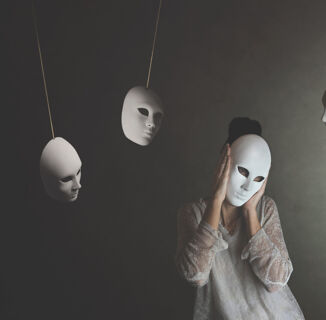There is no cultural icon like Fran Lebowitz.
After a successful writing career in the 1970s (first as a columnist for Andy Warhol’s Interview magazine and then as the author of two humorous essay collections, Metropolitan Life and Social Studies), the now 67-year-old New Yorker has made a name for herself just by, well, being herself. From her time spent alongside other culture creators and tastemakers at the famed Max’s Kansas City, to becoming a permanent fixture at New York Fashion Week and on Best Dressed Lists for her suits and masculine-of-center style, Lebowitz is hailed for knowing everyone and everything — and having an opinion about it all.
Lebowitz was the focus of Martin Scorsese’s HBO documentary Public Speaking in 2010, which helped to establish her continued relevance despite American society’s general eschewing and discarding of older women — especially those with opinions. The openly gay cultural critic now spends most of her career being asked questions in a public forum. Generally, she’s asked about modern politics and society, and her witty quips never disappoint, but, as she asserts in our interview below, there’s nothing she’s not up for answering. L.A.-based readers can test this theory at her next appearance at the Theatre at the Ace Hotel Downtown Los Angeles on Sunday, Sept. 30. In an event presented by UCLA’s Center for the Art of Performance (CAP UCLA), Lebowitz will be in conversation with Matt Holzman of KCRW and then take questions from the audience.

Before these public conversation events, do you ever feel pressure to be funny? Do you ever have any worries about giving people what they’re paying for?
Not at all. Zero. I mean, and I love to talk first of all. It’s something that I just love doing. Luckily for me, otherwise I wouldn’t do it; it takes no effort on my part, unlike writing, which obviously takes too much effort for me. And so to me, it’s really like having a trick thumb. I never think about it, I don’t think about it before, I don’t think about it after. While I’m doing it, I’m really enjoying myself as if it was a recreational activity. I have zero nervousness about it. Zero. I know this annoys people but it’s true. I mean, there are things, of course, I’m nervous about but talking is not one of them.
Are there any specific things you will tell people you will not talk about on stage? Any sort of third rail topic?
No. I mean, the people that interview me onstage, I very rarely know them. So, I meet them, you know, before I go on. I wouldn’t say always but frequently, they want to talk to me before because usually, they’re journalists. They’re not always, but they’re usually journalists, so they have this habit of being prepared. So they sometimes want to go to questions. I do not allow them to tell me the questions before. I do not want to know. I do not want to know the questions, I refuse to know the questions. Sometimes they start to tell me the questions. I prevent them from doing so. If someone asked me something that I will not answer, I’m just saying, I’m not answering that. But that doesn’t happen that frequently, you know. The reason I don’t want to know the questions is because it’s not fun to answer questions you know.
It is really fun for me not to know what they’re going to ask me. This is why the part I enjoy the most is the questions from the audience because the audience really has no idea. Because the audience is not made up largely of journalists, you know. No. I mean, a lot of places where I do this, theaters and places like that, where other people come during the course of a year, they have, I don’t know what the word is, but it’s set up so people pass up questions on index cards, for instance. That’s the way they run. I never allow that. I don’t want to see the questions. I don’t want to know the questions.
Some places have mics in the audience. This is something that I do not allow. I mean, sometimes I have no choice about this because sometimes they’re live streaming, which may not be the correct word. Now because of the internet, lots of times, the people running the thing care more about what’s going to be on the internet than what’s happening in the theater. This is something I don’t like at all because I love the live audience.
What do people most frequently want to know from you — outside of if you’re writing anything new or publishing in the near future?
You know, I have to say that since the campaign for the presidency, 90 percent of the questions are about Trump. It’s always, and I’ve been doing this since you know, since 1978. And always during presidential election years, you got a lot of political questions. During this campaign, before the election, it was like 90 percent of the questions. Once Trump got elected, it was like 180 percent of the questions and sometimes when I leave the country… I was in Australia where I thought at least in Australia, they’re not going to be interested in Trump. No. Of course they’re interested in Trump. In Madrid, they’re interested in Trump.
But also, out of the country, there’s an accusatory tone to this. Like it’s my fault. You elected him. No, I did not. I feel that’s incredibly unfair. And I myself, of course, am also consumed with rage about this, so I understand why people do that. Sometimes someone — I was somewhere in Pennsylvania where a guy said, ‘Can we talk about something else?’ And I said “Fine, ask something else. It’s up to you.” So sometimes, I get funny questions. And I don’t remember where I was but somewhere where I was, I would say within the year there was a kid, and she must have been something like 13. She must have been with some adult. That’s not generally the age of the audience and she waved her hand so I called her and she said, have you ever met Beyoncé? I’ve never been asked that before.
What was the answer?
I said, “Yes, I met Beyoncé when she was a child.” She was in a group called Destiny’s Child, which was I think maybe Beyoncé and her sisters. I’m not a scholar on Beyoncé, and there used to be a big AIDS benefit in New York every year and they had a huge number of celebrities and famous athletes and it was an event for the children of rich people. The tickets to get in there were in the hundreds and hundreds of dollars. Raising a lot of money. In order to appease these rich people, the entertainment at this thing was incredibly good and they always had, at the end of the day, they had them a couple years in a row, this group. They were little girls, really. I would hear people say “You should come hear these kids!” No, no, let’s go get something to eat. And so that’s when I first met Beyoncé. I mean, that’s the only time I met Beyoncé. I’m sure she will not remember this, but this little kid didn’t even know about this so I was able to educate her.
Is there anything you don’t get a chance to talk about or get out that you would really love to?
I don’t know. I never thought about it. There’s a question I never had. I don’t really care what people ask me. You know, I mean, it doesn’t matter to me. Sometimes people ask me things I don’t know the answers to. Like, I was in Toronto. I try to read all the newspapers before I go because I don’t know the names of the politicians there, you know. When I was in Australia, I really didn’t know. I had to ask people who’s the prime minister and who’s the — because sometimes they do ask you questions about their local politics. I wouldn’t know that. I prefer to know the answer. But I don’t feel it’s a stain on my reputation that I don’t know the politicians in Melbourne.
In other interviews, with you, I heard you mention that you’d sometimes go to gay bars or spaces, but never lesbian bars, and I was curious if you ever try to go to lesbian bars and if you like or dislike them?
You mean when I was young? You can’t mean now. When I was young, it was another world. It’s different for everyone from the time they’re 20 to the time they’re 67 obviously. In this particular instance it’s because being gay was really the same from like the 15th century until like 20 minutes ago. So I didn’t. Also New York was a very particular moment then. So the place that I went to all the time when I was young was Max’s Kansas City. Max’s Kansas City was a place that there had never been a place like that before or since.
So it was literally a moment in time, but of course, like all young people, I mistook this for New York. When you go to a place for the first time, and I lived in New York, this is New York to me, OK? I don’t remember before because I wasn’t there before but it never happened again. So, it was very easy to pick girls up at Max’s Kansas City even though it was not a gay bar, you know? It was, so I did go in my lifetime probably I would say, I don’t know exactly, I would say tops six times in my life did I ever go to lesbian bars. I didn’t like them. They were — first of all, all the gay bars in New York, the word gay when I was young meant lesbians and gay men — now it’s a separate thing. They were all run by the mafia. Every single gay bar was run by the mafia. So they were horrible in the sense that they were incredibly expensive compared to other places, they were rough, I know some people liked them, I did not like them. I didn’t like the atmosphere, I didn’t like the feeling of being ripped off. It was so extreme to me. I just hated it. I hated that atmosphere.
Mostly, though, I just didn’t have to go. I mean, people went to gay bars to pick people up. I didn’t have to. So I hardly ever did. Now, gay bars — you would think of, I guess, men’s gay bars. There were more of them, of course. I might have gone to them a little more frequently but not really because maybe I would go with a friend, a guy who was a friend.
I don’t think I spent a lot of time at gay bars, either gay men or gay women bars. But there was a whole world, you know, where it didn’t matter. And that was the only world that I would show anywhere in the country.

What do you feel about when people of all gender and sexualities call you a sex symbol? How do you feel about that?
People call me a sex symbol now?
Yeah.
I was unaware of it but of course, it’s flattering.
You’ve never heard that before?
No. I mean now? You know, I’m not on the internet. This must be on the internet. So, who would not like that? The kind of people who say they don’t like that, they’re usually like young movie stars and they want to be taken seriously. I have no trouble being taken seriously. I’m happy to be a sex symbol.
I was curious about what your relationship is like with Susan Sontag. I was reading something where you were defending her for not being really fully open about her sexual identity while she was alive.
That must be the only thing I ever defended Susan about. Susan was older than me, but as I just said, it didn’t make any difference for how it felt to be gay in the world, no matter where you were from. No one was born in Max’s Kansas City, so people came from other places, right? I had even sympathy for — I’m not going to say his name, but there is a Republican senator who strikes me as gay and I have no sympathy for him, for his politics which are despicable. I have sympathy for him for that, because I’ve been through that and it’s awful, OK? And it doesn’t matter. The world changes — it doesn’t mean you change because inside, how you feel, you don’t change how you feel. Whatever they put in you when you’re little, it stays in you. You know? I hear myself saying stuff my mother said that used to drive me crazy. I mean, I’m not talking about anything very profound.
So I have sympathy for Susan for that, absolutely. It was really hard, period, just to be a woman in those circles. Really hard. And by the way, women who were straight were accused of being gay because it was an accusation and that was simply because they were too smart to be women. What kind of woman would be so smart? She must be a lesbian. It was very difficult. And everyone around my age, older mostly, the people are dead who are older than me, or even people who are younger. There are people now who are really young, 20 years old, and they have trouble with it. I mean, it is a zillion times better than it was. Nothing has improved so much. Nothing. And it’s like literally the difference between chattel slavery and you know, being black now. I’m not comparing being black to being gay. I’ve always been very offended by that comparison because they are not alike. But I had to have sympathy for people like that. I think for Susan in regards to that, [I have] a lot of sympathy for her not because it was Susan, who was a particularly unsympathetic character I might say. I have sympathy for people in general. I always argue with people about this. Always. I think that the thing that I always wanted most in my life is just freedom and that also means freedom of not hearing what to do from either side.
Interview magazine has gone through such an interesting trajectory. Do you have any thoughts about what’s happened with it?
No. I haven’t seen it for hundreds of years. I believe it went out of business, but maybe it was resurrected. You know, I think one thing that people don’t realize is I left Interview in 1981. So I mean, the Interview that most people know at all I have nothing to do with.
No nostalgia? Are you nostalgic in general?
I’m not. I mean, I’m nostalgic in a personal way. You know, I have a friend that we’ve been friends since we’re 4 years old. This is to me a really unusual thing because we grew up on the same street, OK? So we have been friends for 63 years. So when I see her, we talk about our childhood. And I have that kind of nostalgia and that is the kind of nostalgia I think people should have. The nostalgia people have now that has poisoned the culture I think is horrible. I think personal nostalgia is one thing: “Oh, remember that restaurant that used to be here?” Everyone does that. There’s nothing wrong with that.
But I’m telling you that I am on the street all the time. I’m on the subway all the time and I never leave my apartment without having at least one, sometimes 10 kids coming up to me and saying things like “Oh, I wish I lived in New York in the ’70s.” Now I think that is awful. I think it’s awful to be that age and be looking backward. When I was that age, I didn’t think “If only I lived in New York in the ’40s.” I never thought that. People who are young, they’re supposed to do new things. That’s their job.
That’s a thing you do when you’re old. I think that it is, and it’s mostly pretty lighthearted. I would get generally, “I’d wished I’d been to Max’s,” “I wish I knew this person or that person.” “I wish New York was more like that,” and that is something, of course, I wish myself. I spend a lot of time trying to figure out was this really better or was it better because I was 20. Was New York more fun in 1971 than it is now or is it just more fun to be 21? It is more fun to be 21, so if you’re 21 and you don’t know how to have fun, I have bad news for you. It’s not going to get any more fun. You know? “If you were young now, would you do this?” I found this to be a ridiculous expression, by the way, because if I was young now, I’d be a different person.
So I think that that kind of nostalgia for a way of life or what people perceived it as a certain kind of bohemianism which certainly doesn’t exist anymore, that is true. It’s not a great thing for the culture but a really, really dangerous thing for society is this kind of nostalgia that Trump retails because this is nostalgia for things that were despicable. Despicable. I mean, truthfully despicable. “Didn’t it used to be better?” Didn’t it used to be better to be a straight, white, gentile man? Yes it did. I have news for you guys — it’s not bad enough for you yet. And that’s what that Trump thing is. Giuliani did the same thing. When Giuliani ran for mayor the first time, you know, people didn’t know who he was. He was a prosecutor but he was running these TV ads, I don’t remember what year this is but I’m sure you can look it up on your modern devices, he started running these ads on TV and I kept saying to people, do you see these ads for Giuliani? Do you understand what he’s saying? He’s saying vote for me and it’ll be 1952 again, OK? And he’s the thing: who was 1952 really good for? OK? So let’s look at that. And those people who want it to be 1952 again are the people that I want most life to be really bad for.

I would love to know if you think there are any misconceptions about you?
Um. I don’t know, like what?
Something that you find is frequently either written about you or said about you that you think is an erroneous take on Fran Lebowitz.
People think I’m very confrontational, which I am not at all. You know, people think that I have a lot of like public arguments with people or fights or that I’m aggressive, which I’m not. I mean, I am not confrontational. I hate to fight with people. I will not do it in public. In other words, I always turn down any type of engagement where they find someone who is the opposite of me and want me to fight with them. I won’t do that.
And so that is a pretty big misconception about me. I am never like that, even with people that I really dislike. I don’t like to do that. I always say I would rather talk behind people’s backs. That way, they hear it more than once. But I’m not like that at all. And the culture of that, that we have now of people fighting into each other on television or fighting with each other in public forums is something I won’t do and I think it is incredibly non-productive. You’re never going to change somebody’s mind. I think people also have the idea that I’m trying to change people’s minds. That is of course my desire, but long ago I gave up the idea it would happen. So very often, people would say “You’re a bad role model because you smoke cigarettes.” People have been telling me this my whole life. “You shouldn’t smoke cigarettes” when you could still smoke cigarettes on television for instance, you used to be able to like on the Letterman show or something. Lots of people–the women who was the editor of Vogue at the time — Grace Mirabella — would tell me, “You have to stop smoking on television. You’re a terrible role model.” And I said “Grace, no one does what I say. I try to get people to do what I tell them, no one ever does it. I’m the opposite of a role model.”
UCLA’s Center for the Art of Performance (CAP UCLA) presents author, journalist and social observer Fran Lebowitz in conversation with KCRW’s Matt Holzman before she goes one-on-one with the audience on Sunday, Sept. 30 at 7 p.m. at The Theatre at Ace Hotel Downtown Los Angeles. Tickets for $29.50–$59.50 are available now at cap.ucla.edu and theatre.acehotel.com, 310-825-2101 and at The Theatre at Ace Hotel box office.
Images via Getty
Help make sure LGBTQ+ stories are being told...
We can't rely on mainstream media to tell our stories. That's why we don't lock our articles behind a paywall. Will you support our mission with a contribution today?
Cancel anytime · Proudly LGBTQ+ owned and operated
Read More in Culture
The Latest on INTO
Subscribe to get a twice-weekly dose of queer news, updates, and insights from the INTO team.
in Your Inbox

